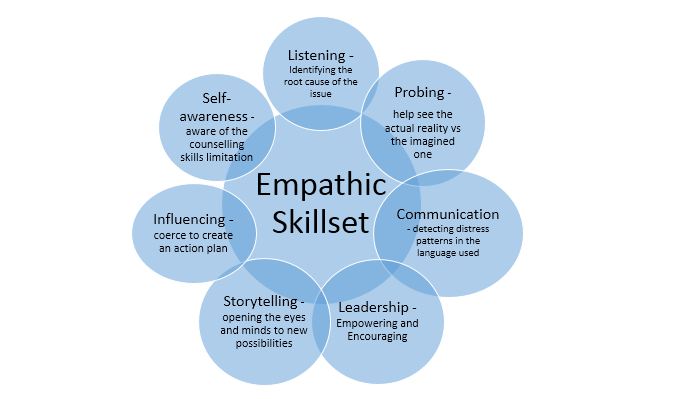How L&D Professionals can act as Workplace Counselors

Part 1 of this article focused on the need and model of workplace counseling and why an L&D (Learning and Development) professional would be an ideal fit for the role of a workplace counselor. Here, in part 2 of this article, we explore avenues and methods on how an L&D professional could embed the counseling theme and mindset in the L&D curriculum as well as during workshop facilitation.
L&D professionals are typically seen by the corporate world as “trainers” or “facilitators,” who walk the talk. Employees are generally willing to listen and abide by the management principle(s) or lessons introduced by an L&D instructor, as they facilitate the program with the aid of case-studies, personal examples, gamified learning methods, etc. Incidentally, the counseling theme, on the other hand, which revolves around concepts like personalization, empathy and emotional intelligence also find a natural parallel in the L&D space. Hence, it is with the ease that an L&D professional can also simultaneously perform the role of a workplace counselor. This is a three-step process – 1) The L&D professional personalizes the program content before the workshop, 2) He or she displays empathy towards the participants during the workshop and 3) He or she becomes emotionally intelligent to the employee in distress who seeks help after the workshop.
Let’s explore these three aspects of counseling one by one.
Personalization before a workshop:
Apart from cookie-cutter L&D programs which cater to mass unknown audiences, a good L&D professional would undertake a lot of research, including interviewing different stakeholders to understand the real need, context and learning style, while defining the framework of a need-based program. Typically, a program gets designed for a certain issue based on the request from the Business. Here, unless the L&D team probes the Business leaders and understands the origin of the issue, one could end up creating a solution for a problem which didn’t exist.
Further, many times, the L&D department leans extensively on training aids like case-studies and video-tapes which are mostly Western in context. While it is true that a management principle could be generic and have universal applications, one still needs to breakdown the principle to terms and conditions which will be applicable and likable in a local context. Employees relate better to the visual and verbal messages that are located in their immediate environment, than to those that have their relation to a foreign environment. This is a psychological phenomenon that exists all over the world.
For example, while facilitating a program on “Time Management,” a good L&D instructor would stress the advantages of “multi-tasking” before spelling out its detrimental effects. Here, it would be suicidal for an L&D instructor to quote multiple (mainly western) research on multi-tasking, which comes down heavily on this understated skill. While it may be true that one achieves more by doing less, an empathetic L&D instructor would take into consideration the role of the local culture too and explain how it can aid in upholding the management principle under study. For example, if a certain culture prides in multi-tasking, then the importance of multitasking tasks which are important and are of priority should be highlighted.
Being empathetic during a workshop:
Apart from programs which are delivered through a digital medium, a good L&D instructor would warmly and personally relate to all their training participants. They would be keen to know every individual’s views regarding the program and continuously seek feedback, so that they can dynamically customize the training program, instead of overtly being conscious about time and the prescribed syllabus. Besides, while facilitating, the instructor tacitly elucidates the personal benefits in adopting a management principle, apart from sharing some workplace benefits like increased work productivity, client centricity, etc.
For example, while facilitating a program on “Assertive Communication,” a good L&D instructor, apart from listing benefits such as reduced stress, increased self-confidence, improved decision-making skills, would stress benefits such as improved communication and honest relationships one tends to create in personal circles too. Moreover, the instructor would ask probing questions such as “Are you assertive with your friends and family, if not your colleagues?” or, “When was the last time you expressed your displeasure or discontent openly and politely with them?”
This “360-degree empathic flythrough” would not only help the participants visualize the solutions to their problems through real-time-personally-identifiable scenarios, but also make them realize the ripples or cross effects of their actions and behaviors. Empathetic facilitation is always quite effective, as the employee begins to seek and apply a “cross-domain fix” to their struggles, which would be lasting and comes with a personal touch.
Being emotionally intelligent after a workshop:
Sometimes, after the workshop, an employee would like to confide into an L&D instructor about his personal struggles in upholding a certain principle. During this confidential meeting, the L&D professional needs to be emotionally intelligent by recognizing, understanding and influencing the emotions of the employee towards the greater good.

Ideally, a good L&D professional, who facilitates programs on “Emotional Intelligence,” would possess the above “Empathic Skillset” – This skillset invariably qualifies him/her as a workplace counselor too, where they can mentor employees in distress, unless the employee’s struggle is quite acute like suicidal thoughts, etc.
It is true that the arena of counseling is a specialized, sensitive, vast and an emotionally draining experience. However, a word fitly spoken is like apples of gold in settings of silver. There is great power in personal conversations, which are focused, empathetic and emotionally intelligent. And who better to perform the role of a workplace counselor, than the L&D professional – whose noble profession is to educate, inspire and not just preach.
*Click on this link to go to Part I of this essay.
(The views expressed in the article are author’s own and the author’s employer does not subscribe to the substance or veracity of the views expressed herein)











